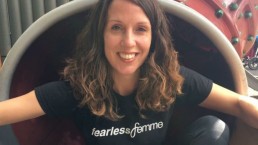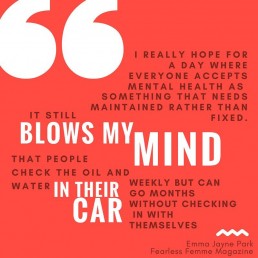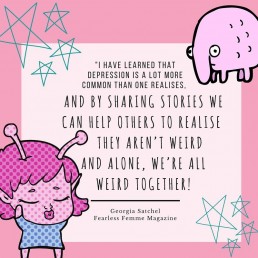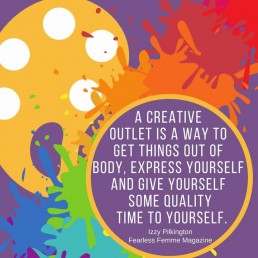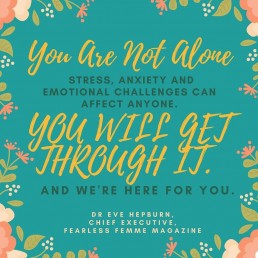Image credit: Ashling Larkin
Content Warning: brief mentions of suicide
A new grassroots movement to challenge sexism, reduce mental health stigma, and save the lives of young women across the world has kicked off in Scotland today (Tuesday) at a prestigious launch.
The event will be attended by the Minister for Mental Health and the Principal of The University of Edinburgh, who will be joined by leaders in the worlds of mental health, equalities and education to ask the stark question of how we save young women from mental ill-health and, at worst, suicide.
Fearless Femme1 will launch its inspirational new magazine and campaign to help femmes — including fearless young women and non-binary people2 — join the ‘rebelleon’ and fight mental health stigma. The publication’s heartfelt content is written by and for young women and femmes dealing with mental health issues.
Minister Maureen Watt MSP has welcomed the new Edinburgh-based social enterprise start-up, saying it can provide an “invaluable” contribution towards helping Scotland’s young people improve their mental health, talk about their mental wellbeing and reduce stigma.
The event will also provide a launch-pad for Fearless Femme’s new evidence-based research programme aimed at informing policymakers and university leaders on how to help young women who are struggling with mental ill-health and to push for policy change.
The brainchild of social entrepreneur Dr Eve Hepburn, Fearless Femme developed as an idea after Dr Hepburn lost her step-brother to suicide two years ago, having already suffered a breakdown and mental ill-health after a series of traumatic events, including the sudden death of her boyfriend when she was just 19 years old.
“After experiencing a breakdown and losing my step-brother, I decided it was time. I needed to stop people from killing themselves, to let them know that they weren’t alone, and that they were going to get through it,” she said ahead of the Fearless Femme launch event.
Young women are the highest-risk group for mental illness in the UK. Research estimates 46% of young women between 11 and 21 years old have sought out treatment for mental health conditions including anxiety, depression and eating disorders.3
Research has shown that psychological distress amongst young women is linked to the growing pressures that this group faces: pressures to look beautiful and thin in an age of ‘airbrushing’; social media pressures; stress at school and university; and an increase in sexual harassment. Very often, these pressures lead to low self-esteem and body image problems, with evidence suggesting that young girls start to worry about their body image from the age of 11.4
However, existing magazines that target young women often exacerbate stress, whereby “3 out of 4 teenage girls feel depressed, guilty and shameful after spending three minutes leafing through a fashion magazine”.5
Fearless Femme sets about challenging these cultural norms by empowering young women to overcome stress and other mental health challenges through its new online magazine and growing community of ‘rebelles’, as well as its research and campaigns for policy change.
The new Scottish-based social enterprise has grown from a small seed of an idea in Dr Hepburn’s head when she was an academic working with young female students, to now having five staff, an office, and rapidly growing support for its cause and method.
Minister for Mental Health Maureen Watt MSP is expected to attend tonight’s event at the University of Edinburgh, along with 100 other invited guests, including the new Principal of The University of Edinburgh, Professor Peter Mathieson, who took up the role last month.
Speaking ahead of the Fearless Femme launch event, Minister Maureen Watt MSP said: “Scotland is committed to helping our young people improve their mental health and tackle problems head on. To do that, we need to open up the conversation, encourage people to talk about their mental wellbeing and reduce the stigma around discussing mental health, particularly in the Year of Young People. Projects like Fearless Femme make an invaluable contribution to that. The launch of this magazine is yet another example of the innovative work going on across Scotland to support young people.”
Louise Macdonald OBE, Chief Executive of Young Scot and Independent Chair of the new National Advisory Council on Women and Girls said: “To ensure meaningful change around gender equalities and mental health, the most important thing we can do is create space to allow those with direct experience to share their stories and ideas, to challenge the status quo. I’m looking forward to listening carefully to what they have to say and learning from their insight and expertise.”
And with a key aim of Fearless Femme being to support young women and femmes through their student years, the new Principal of The University of Edinburgh said he was delighted to support the launch.
Professor Peter Mathieson, who took up the role last month, said: “The mental health of all of our students matters greatly to us. I am delighted to support this particular event with its focus on young female students and LGBTQ+ students.”
Dr Eve Hepburn, Fearless Femme Founder and Chief Executive, explained the reasons why she was launching Fearless Femme: “After experiencing a breakdown and losing my step-brother to suicide, I made the decision that I needed — not just wanted, but needed — to establish Fearless Femme. I needed to stop people from killing themselves. I needed people — like my 19-year-old self, reeling from grief from the death of her boyfriend — to know that they weren’t alone, that they were enough, and they were going to get through it.”
She first developed the idea when, in her previous career as a senior lecturer at The University of Edinburgh, she noticed a worrying increase in the number of female students struggling with their mental health. She established Fearless Femme in 2017, after undertaking a project for The University of Edinburgh’s Institute for Academic Development (IAD) that explored how universities can support the mental wellbeing of their students.
Dr Hepburn’s research revealed mental ill-health amongst students was increasing, and that some categories were particularly vulnerable (female, LGBTQ+, black and ethnic minority, and international students). The research also revealed the benefits of forms of online support, with young people often looking online for information and support for their mental health in the first instance.
Fearless Femme CIC is a social enterprise and has received the support of Firstport, The Melting Pot’s Good Ideas Academy, and the School for Social Entrepreneurs Bank of Scotland Programme.
Fearless Femme has also received funding from the Scottish Government and the European Union (EU) — through the European Structural and Investment Funds (ESIF) — to develop a project partnership with The University of Edinburgh to support the mental health of young female and non-binary students. As part of this project, Fearless Femme will collate evidence and data about mental health issues which it hopes will improve, and even save, the lives of thousands of young women and femmes.
For Twitter follow @FearlessFemme and the launch event hashtag #IAmFearless.
1 Fearless Femme is a community interest company (social enterprise) founded in 2017 that aims to empower young women, non-binary people, and anyone who identifies as ‘femme’ to overcome stress, anxiety and other mental health issues. More information about Fearless Femme can be found at https://www.fearlessly.co.uk/our-story/
2 “Non-binary” refers to any gender that is not exclusively male or female; some references also use the terms transgender or genderqueer. Fearless Femme is inclusive of non-binary people and anyone identifying as feminine as they are often affected by the same issues as young women. However, because national statistics and research on mental health tends to be gathered according to gender-normative measurements, non-binary people often fall under the radar, leaving their mental health needs and issues unchecked.
3 46% of girls and young women in the UK aged 11-21 have sought treatment for a mental health condition including anxiety, depression and eating disorders, making young women the highest risk-group for mental illnesses in the UK. Source: Girl Guiding Association.
4 A government-funded study carried out by Dr Praveetha Patalay in 2017 revealed that girls aged 11 display a ‘gender-specific vulnerability’ to mental health issues; that half of 15-year old girls in Scotland and England think they are fat; and that a quarter of girls aged 14 in the UK are experiencing depression, loneliness and self-hatred. See https://www.theguardian.com/society/2017/sep/23/stress-anxiety-fuel-mental-health-crisis-girls-young-women
5 Narrow ideals of female beauty and body shape, conveyed through magazines and other media, have contributed to body image issues amongst girls and young women. Source: Women’s Media Centre 2012. https://www.womensmediacenter.com/news-features/womens-magazines-and-the-cult-of-hypocrisy

